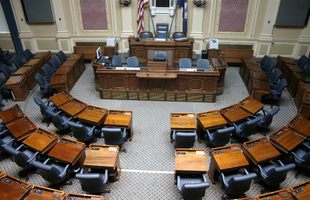
Overview
The bicameral Virginia General Assembly consists of the House of Delegates and the Senate. The Virginia General Assembly convenes annually on the second Wednesday in January. The General Assembly is a part-time legislature, meaning that elected members convene for a period of only a few months per year in order to debate and pass legislation (though members may “pre-file” legislation prior to the session). General Assembly sessions typically begin in January and end in March of each year, often forcing members to scramble to pass a years’ worth of statutes and regulations in mere weeks. On years ending with an odd number, the General Assembly convenes for 30 days; on years ending with an even number, the General Assembly convenes for 60 days. The 2025 legislative session convened on January 8, 2025, and adjourned on February 22, 2025. A reconvened session was held on April 2, 2025. Prefiling for the 2026 Regular Session begins on November 17, 2025.
The Senate of Virginia is composed of 40 members with each Senator serving four year terms. Each Senator receives a salary of $18,000. The Senate is led by the Lieutenant Governor (LG) with the President pro tempore presiding over the Senate in the LG’s absence. The Senate is currently controlled by the Democratic Party with a 21-19 majority as of January 2022. The State Senate is presided over by the Lieutenant Governor of Virginia, Winsome Sears (R). The Senate Majority Leader is Sen. Scott Surovell (D), and the Minority Leader is Sen. Ryan McDougle (R).
The Virginia House of Delegates is the lower chamber, made up of 100 members who serve two-year terms. Each Delegate receives a a salary of $17,640. The Democratic Party currently controls the House with a 51-49 majority as of 2024. The House of Delegates is presided over by a Speaker of the House, Delegate Don Scott (D). The House Majority Leader is Del. Charniele Herring (D), and the House Minority Leader is Del. Todd Gilbert (R). The duties of a Delegate are consistent with that of a Senator, in that they write, amend, and pass legislation in committees and as a House.
Explore the demographic make-up of the General Assembly by the Virginia Public Access Project.
Stream the House of Delegates’ chamber.
Stream the Senate of Virginia.
The Governor of Virginia makes an address at least once per session to the General Assembly on the state of the Commonwealth. The Governor can veto legislation passed by the General Assembly, and must sign legislation into law. Article IV, Section 6 of the Virginia Constitution states that “The Governor may convene a special session of the General Assembly when, in his opinion, the interest of the Commonwealth may require and shall convene a special session upon the application of two-thirds of the members elected to each house.”
Virginia operates under a two-year (biennial) budget cycle. Each year the Governor prepares the proposed budget bill for introduction by the General Assembly. The bill is initially adopted in even-numbered years and amended in odd-numbered years. Before the General Assembly adjourns each year, a conference committee resolves any differences between the versions of the budget passed by the two houses.
Virginia is a so-called “Dillon’s Rule” state, which means that localities can only wield powers explicitly authorized to them by the state. Read about the National League of Cities efforts to reform legal principles in order to empower cities.

How to Research Members of the General Assembly
- Look up your Virginia legislators.
- Once you have identified your legislator, learn more about them at the Virginia Public Access Project.
How to Track Legislation
- Track the status of legislation in the Virginia Legislative Information System
- The Virginia Public Access Project offers a searchable and user-friendly tool to look up legislation by issue, key words and numbers
Committees
After being introduced by a legislator, all bills and many resolutions are referred to a committee. Bills and resolutions introduced in the Senate of Virginia are referred by the Clerk of the Senate. Bills and resolutions introduced in the Virginia House of Delegates are referred by the Speaker of the House.
House of Delegates Committees
- Agriculture, Chesapeake & Natural Resources
- Appropriations
- Communications, Technology and Innovation
- Counties, Cities & Towns
- Courts of Justice
- Education
- Finance
- General Laws
- Health, Welfare & Institutions
- Labor and Commerce
- Privileges & Elections
- Public Safety
- Rules
- Transportation
Senate Committees
How to Comment and Participate
- Speak remotely and provide written comments in House of Delegates meetings
- Virginians have the opportunity to provide committee testimony without having to travel to Richmond. Both House and Senate officials have said they will accept committee testimony via Zoom and receive written comments online.
- Delegate [Name]
House of Delegates
PO Box 406
Richmond, VA 23218 - Senator [Name]
Senate of Virginia
PO Box 396
Richmond, VA 23218
Legislators are more likely to respond to you if you are a registered voter. Register to vote or update an existing registration.
Tips for communicating with your legislator
- Identify yourself. Let your legislator know that you're a constituent and explain your stake in the community that they represent.
- Know the issue. Be knowledgeable and well-researched about the issue you want to discuss. Your legislator will take you more seriously if you appear professional and intelligent about the topic.
- Share your position. Be persuasive in explaining your stance, using facts, statistics and evidence. Use personal anecdotes or stories of friends in order to support your evidence and argument.
- End with a hard ask. End your meeting by asking them if they plan to support the discussed legislation. Always remain respectful and thank them for their time.
